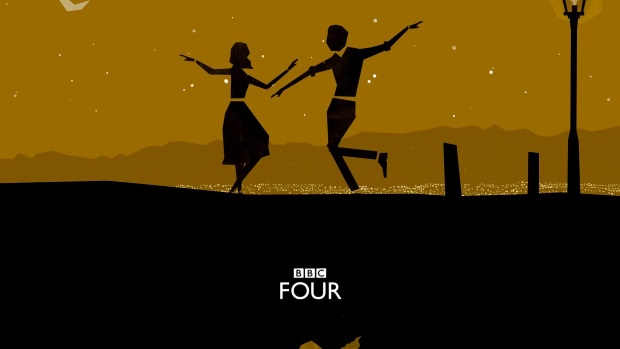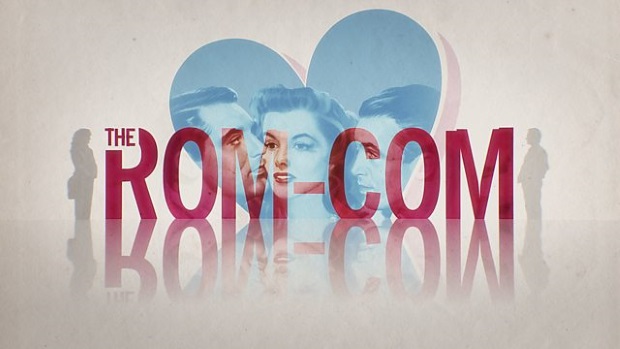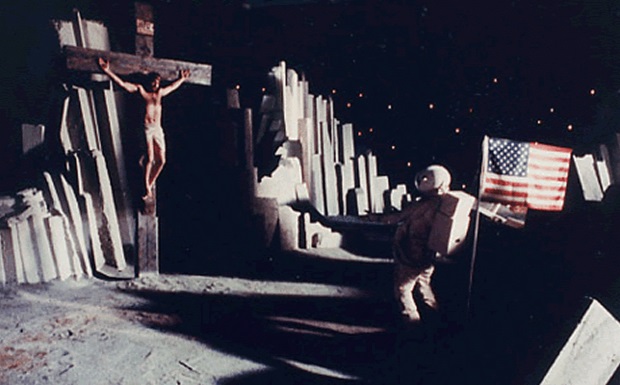Mark Kermode & Kim Newman interview: Secrets Of Cinema
We chat - well, try and get a word in edgeways - with Mark Kermode and Kim Newman, about BBC Four's Mark Kermode's Secrets Of Cinema.
After a conversation about llamas, Mark Kermode and Kim Newman settled down for a chat about their new BBC Four project, Mark Kermode’s Secrets Of Cinema. It’s a programme that examines genres of cinema one by one, with five episodes making up the first series.
I’d like to tell you I interviewed them. As you’re about to find out, I threw in the odd question when I could get a word in, and listened. They were very, very good company…
Let me start with the Simon Mayo opening question. Can you just explain to us what Mark Kermode’s Secrets Of Cinema is?
MK: It’s a five part series, looking at five different genres, and basically trying to trace recurrent themes and patterns through them in a way that’s entertaining. What happened was, when this whole thing came about, I said the only way I could do this was having Kim writing it with me. I needed someone with an encyclopaedic knowledge. But also because very early on, I read Kim’s Nightmare Movies, and it was like an analytical book but written as a narrative. You could actually sit down and read it.
I said to Kim that I really want to work with you on this, I want you to be the lead writer on it. Kim’s immediate response was ‘basically you’re trying to do something that should take two years in three months!’
KN: That’s exactly right!
MK: And I said yes!
KN: As usual with the BBC, there wasn’t enough time to do it properly, but we tried! We did our best! Throughout various adversities! I’ve become blind to the number of drafts that we’ve been through. But I think it’s something we can be proud of. I think it’s got substance, and is accessible.
The main reason for doing it is that there hasn’t been a show like this before. Even in the deep history of TV discussions of cinema, they’ve always been about a director, a movie star, sometimes even a studio. One thing we’ve bent over backwards on is not to use the word genre in the title, or the publicity for the show. But that’s what this is about! About the types of popular – and indeed unpopular cinema, with some of the things we like – that make up almost everybody’s viewing experience. It’s a hugely unaddressed subject, we found. Which is good, as there’s nobody to come along and say that ITV did this better all those years ago!

It’s interesting what you say: I think if you went up to a stranger on the street and said there’s going to be a five part series about cinema on BBC Four, they’d be expecting something academic. And yet the first film you talk about is Splash. You wanted this to be open, and a broad church?
MK: Absolutely. We didn’t want to make something that sounded dry and fusty. We wanted to make something that was fun, because the fact is that Kim and I love cinema. We’ve both been film critics for as long as we can remember. The reason we do it is that we like these movies.
Funnily enough, with one early iteration of something, I remember Kim saying particularly that what you didn’t want at any point was a sneery tone. You were quite right to think that. Obviously when you start talking about some genres it’s very easy for people to slip into what are patterns and motifs as clichés. And we wanted to stay away from that. We wanted to – because we like these films for a start – not sneer at any of them.
KN: We love these movies. Not all of them. But we wanted to lose the snark, that I think has become almost the dominant tone of modern engagement with cinema. Indeed, with everything! We’ve taking the sneering curl out of our lips for a bit, and are looking at stuff on its own merits. I think it came to me a couple of years ago that I did not want to be the kind of film critic who spends their time telling kids why the films they love are rubbish. What you want to do is say, even if it’s not your particular type of stuff, why is this working for its audience? What are they getting out of it? And usually, if something is enormously popular – there are one or two huge exceptions – I can find something of interest in them. There’s something worth analysing. It’s like there’s this other thing about genre cinema. If you see one singing cowboy western, it’s a strange bizarre fluke. If you watch 50 of them, then suddenly it all comes together.
Actually, we don’t have a singing cowboy programme…
MK: Series two!
KN: It’s like every single genre is like that. You see one, you wonder why anyone would consider doing it. But if you watch enough of anything, you start seeing the pattern. As Mark says, I’m very big on narrative, and I like the idea that underneath every popular genre there’s almost like an original text. It’s that thing of the story that’s told over and over again in different forms. And I think that’s what our popular genres are. They’re old jokes we like being told. And the trick of making one of those films is to give people what they want from that particular type of movie, with 10% of surprising or subversive or strange material.
One of the things we came up when we looked at all of these films was for each of these shows, we could pick out five – that thing at the end of the year, when people pick out best and worst. Here’s my list of the ten three star mediocre films that you can barely remember! They weren’t that bad, but they weren’t that good! Every genre has a couple of those. There’s nothing wrong with them. They hit the beats, then it’s over, then you go you want to see something a bit more distinctive.
MK: The other thing that was nice about it was that, for example, when we were doing the romcom thing, I remember Kim saying that The Fly was a bit of a romcom, just that it’s taken a left turn. I like that. I like the fact that there’s stuff about Punch Drunk Love, a film I think not enough people saw, and I hope people go away from the programme and watch it. But one of the most rewarding things for me, we did one about romcoms, one about heist movies… we did a lot of stuff about Dead Presidents, which is a very overlooked movie. There’s a science fiction programme. But the last one is horror. And in a way, we were always going to put that at the back, as we were both on home territory. My worry was always when we got to horror, the problem will be that we won’t find anything new, because we know this stuff.

But something you said, Kim. That you were surprised by how many horror movies started with a journey. That actually hadn’t struck you before.
KN: Yeah. And you consider how many horror movies start with someone in a car, or on a coach, going somewhere. And off the top of our heads, we could name 50 films like that. It seemed to be a dominant mode! We were looking at the horror film as a narrative, in the same way that a romcom is a very strict narrative. And that gave us an idea of what was going on underneath that we had not consider before. And considering we’ve spent most of our lives looking at, and thinking about, horror films, that was a bit of an achievement!
MK: The other thing I want to say is that the series producer is Nick Jones, who I’ve made documentaries with before. And the executive producer is Jon Das. Jon has been really, really helpful. There were times during production when we and the BBC were not entirely on the same page. What Jon managed to do was get us all into a room and thrash out what we were doing. Some of my fondest memories of making this were sitting in Kim’s flat, with me, him, Nick and Jon, all going ‘what’s the name of that film when the person did the thing, but then didn’t do the thing you thought they were going to do?’
You know there’s the TV series where the motto was no lessons learned? In our case, the motto was no sneering. I’m pleased they put the romcom episode first. There was a review on the radio last week where someone said ‘oh for heaven’s sake, do we really need people talking about romcoms? They’re just Hugh Grant films?’ And I just thought yeah, that’s kind of the point!
It was nice to start with romcoms, because I do love Splash. I do love The Shape Of Water. I’m obsessed with Punch Drunk Love. And it was really nice.
KN: One of the films that we don’t mention is the one they’re showing straight afterwards! Move Over Darling!
MK: We had a list of hundreds! The way we started was we said everyone make a list of the films you want to talk about. And the list would come in, and it’d be like pages and pages long. One from me, one from Kim, one from Nick. That was 600 films, and the show is 58 minutes long. Which 500 of these are you going to lose before we even start having the conversation?!
Was availability of the films any criteria in you choosing to talk about them?
MK: Nope!
KN: No!
MK: Availability wasn’t an issue at all. Sometimes it was hard to get hold of some Bollywood films. In the romcoms, I’d been talking to Sanjeev Bhaskar, firstly about how the Bollywood musical tradition fitted into the whole romcom thing. Obviously Sanjeev has made programmes about this. And then later on, I was ringing him up and getting help pronouncing names. Sanjeev did say at first my pronunciation was terrible, but by the end it was better, because Sanjeev was literally on a phone phonetically telling me how to do it!
KN: The thing that has to be said with this is because we use fair use on clips, this is never coming out on DVD! If you want to watch this, watch it on BBC Four and iPlayer, because that’s your shot! Basically, the entire budget of BBC Four for years would be gone if the clips were licenced for any other use!
But I like the fact that this is a one-time only deal!

You say that, but on the BBC website, they describe it as ‘series 1’. Have you seen that?
MK: No!
KN: We’re taking that, and we want a raise!
MK: Thank you for breaking that news to us, Simon! We’re very glad!
Going back to availability from the other angle, is the availability of the films as a viewer. Clearly it’s enormously broad now, but were you conscious of it when you were picking films? Will I come across a film in the programme that I will have trouble finding?
KN: It might be tough finding Sun Ra!
MK: I think most of Sun Ra is on YouTube!
It’s changed a lot…!
MK: Yes. When Nick and I were making the Exorcist documentary all those years ago, I had this whole thing about getting access to the Warner Bros vaults, and they wouldn’t let us in, and there was a shot list of things we had to call up. We found test footage and this, that and the other. The whole thing was a real process.
The other week, just on a whim, I wondered what’d happen if I was making that documentary now and just wanted to research it. I went onto YouTube and put ‘Exorcist outtakes’ in. There is stuff on YouTube, literally scenes of Blair doing the demon scenes without the Mercedes McCambridge voice. There’s special effects footage that I’d never seen. The world has changed! We are moving towards a position where everything is available to everyone all the time.
KN: That’s right. And people spend their time watching kitten videos!
You joke, but I think there’s something to that. When I was growing up, the only film you could watch on television was whatever was on, say, BBC Two, as that was the only movie on at that time. Now, with far more choice, it seems people seem to watch less. When you approach putting a show like yours together, is the curation, inspiring people to seek out films they otherwise wouldn’t, a key factor?
MK: Certainly from my point of you, in the case of the romcoms episode, I would love it if someone watched that, and took away two or three films that they hadn’t seen before. If that happens, as far as I’m concerned, that’s job done.
KN: I like that. There are those people who do those lists online. Both of my major film books – Nightmare Movies and Video Dungeon – someone’s done lists of the films in them online. And links to where people can find the movies. Some of them are probably impossible to see. But I like the idea that people will come in and make lists of what we talk about. There are probably people out there who will make a point of seeing the films we mention, which I think would be cool.

What, ultimately, then, do you want people to take away from the show entire after the five episodes?
MK: From my point of view, I hope it’s entertaining, because we did really try hard to make it accessible. I know everybody says that! Nobody says I want to make a film that’s dumb and inaccessible.
KN: Yep! It’s really dry and dull and completely offputting!
MK: I hope that people, because of the way it’s written, find them fun to watch. I would love it if people come away from the series and watch some other films that I like. I managed to crowbar The Ninth Configuration into the science fiction episode…
Not you, Mark.
MK: Yeah! But we got into a discussion about space films being about cosmic loneliness. And there’s that brilliant scene in The Ninth Configuration where he explains why he won’t go to the moon. But if one person comes away and says I think I’ll check out The Ninth Configuration, then I’d love that! It’d double the amount of people who’d seen that film!
And what about you, Kim? What would be job well done in your eyes?
KN: I would like series two! [Laughs] That’s where we get to the genres that are really niche and interesting. Like the singing cowboys!
MK: You really want to do singing cowboys, don’t you?
That was my dad’s favourite film growing up…!!
KN: Biblical ancient world epics, that’d be cool. We haven’t done the musicals…
MK: No, we didn’t!
KN: War movies. There are all kinds of other… we deal with big genres, like horror and science fiction. Whereas the heist movie, the romcom and coming of age are slimmer genres. I’m interested in picking out a few more of those genres and having a go at them!
MK: Series two is what we want!
Mark and Kim, thank you very much!
Mark Kermode’s Secrets Of Cinema series 1 is currently on BBC Four and BBC iPlayer.